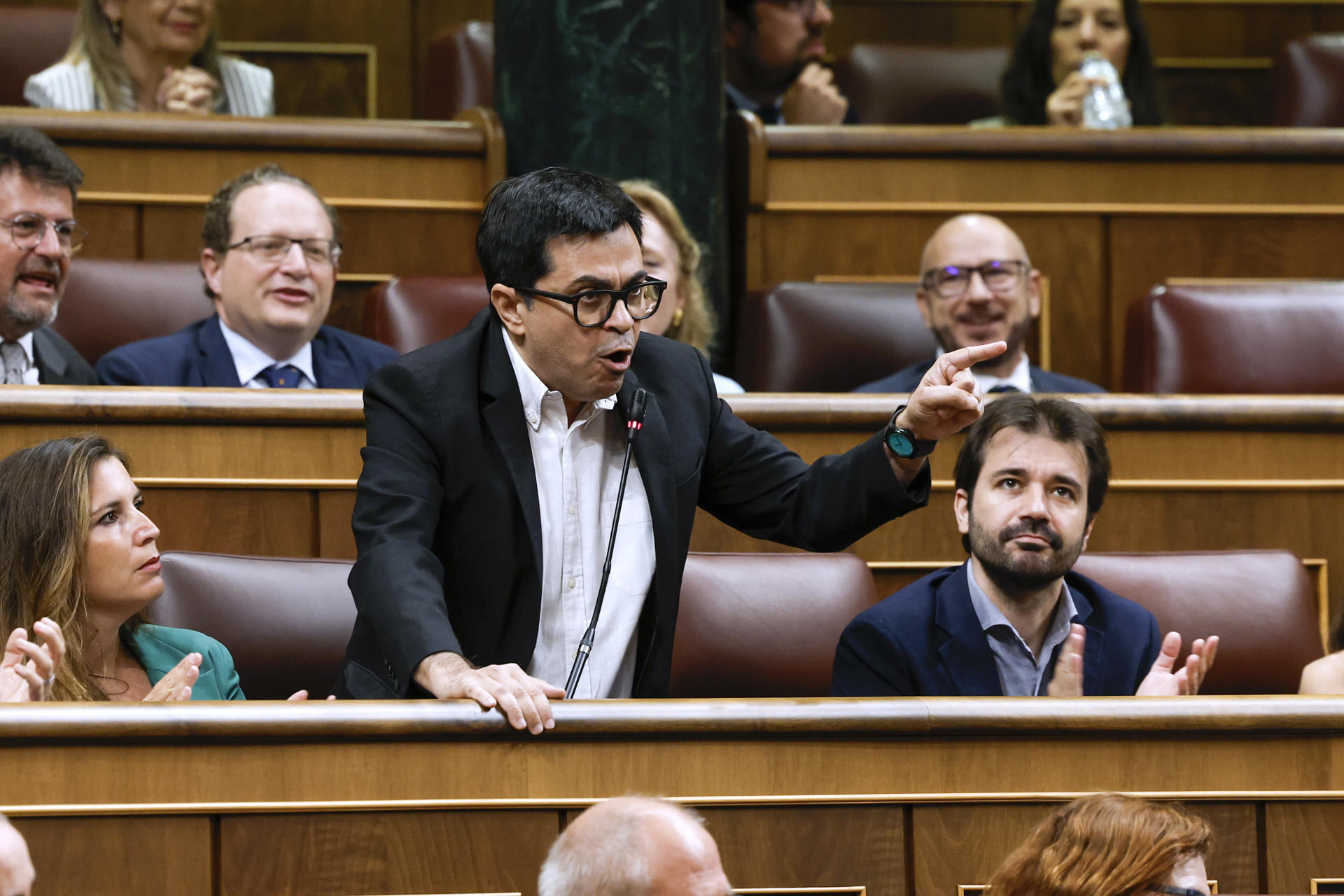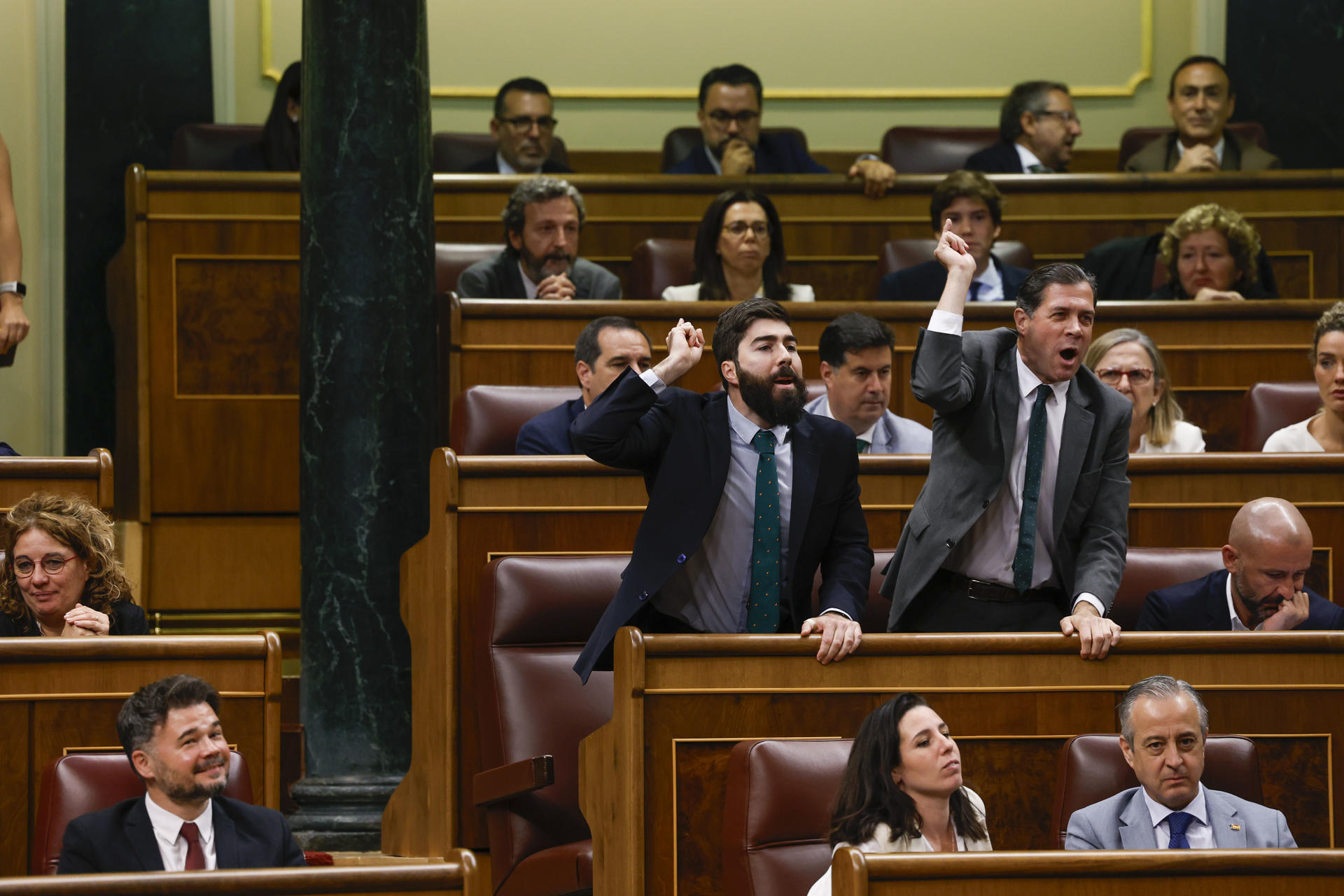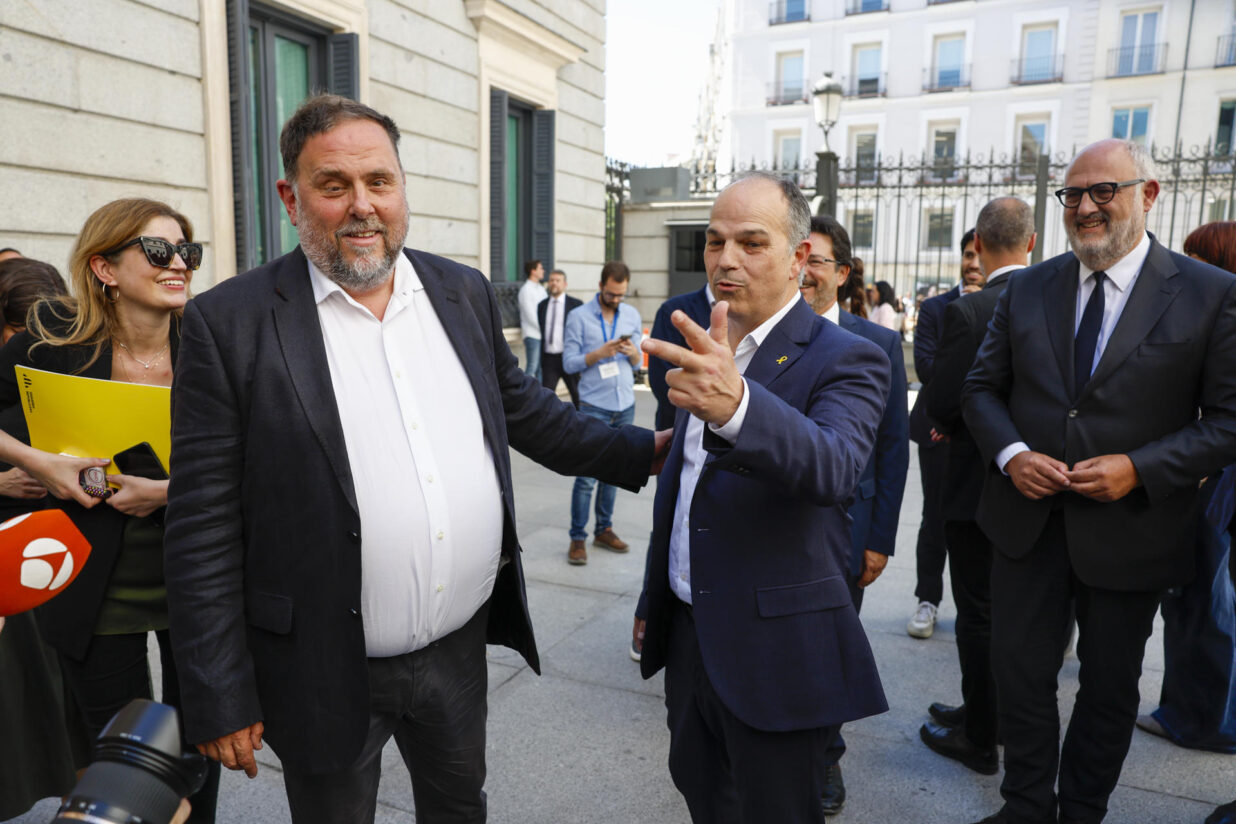30.05.2024 - 18:24
Since this time it was definitive, there was more tension in the Spanish Congress chamber than in previous votes on the amnesty law. More murmurs, more anticipation in the guests and press galleries, and more shouting and bad manners from the far right, which tried to disrupt a session where, one way or another, everyone confirmed that Spain was suffering a memorable defeat. Six years and eight months after the declaration of independence, after 5,000 reprisals, with people imprisoned, disqualified, beaten, fined, persecuted, threatened, and (still) exiled, an amnesty law was approved that is currently expected to benefit about 1,600 people, according to Òmnium figures. This kind of judgment day for Spain came with sour faces on the PP benches, which toned down their apocalyptic rhetoric to contrast with the shouts and insults from Vox deputies; with a discreet role from Pedro Sánchez, who hid as much as he could, and with much emotion among the pro-independence deputies, with hugs between representatives of ERC and Junts who attended the session, including Oriol Junqueras and Jordi Turull, two former political prisoners who, five years ago, sat in the dock not far from here, at the Supreme Court.
The hugs and emotions of the pro-independence MPs contrasted with the bitterness of the Spanish right-wing parties, and even with the lukewarmness of the socialist deputies, who left the defense of the amnesty to a second (or third) tier deputy, Artemi Rallo, to lift the veto imposed by the Senate with the PP’s absolute majority. But Rallo found himself with an unexpected moment of glory; just as he was about to speak, several Vox deputies stood up and, like brawling professionals, shouted at him and his leader, Pedro Sánchez, and the other pro-amnesty deputies.

It all stemmed from a fiery intervention by Sumar deputy Gerardo Pisarello, who asked to respond to a reference Santiago Abascal had made during his speech, when he criticized him without directly mentioning him, for removing the Spanish flag from the balcony of Barcelona City Hall when he was a councilor. The chamber president, Francina Armengol, granted him the floor, and Pisarello said vehemently: “I am the grandson of Andalusian republicans; when I hear your neo-Francoism, I feel proudly Catalan and proudly Latin American, and even if I were from Senegal or Donosti, I would tell you that those of us who work and live here do not accept any lesson from the gentlemen who have always lived with straight backs and are part of historically Islamophobic, anti-Semitic organizations that have paid homage to the butcher of Rafah.”
The final part of his speech was practically inaudible due to the shouting from the Vox deputies, who seized the moment to try to disrupt the session. The aggression in their gestures and words was extraordinary and calculated. Far-right deputy José María Figaredo asked for the floor to respond, feeling alluded to when Pisarello spoke of “gentlemen who have always lived with straight backs.” But it was an unregulated request, Armengol did not grant him the floor, and the spectacle began, with deputy Manuel Mariscal standing, crazed and shouting non-stop, “Traitors!”, “You humiliate Spain!”, “Accomplices!”. He was not alone; beside him, Pedro Fernández (Vox’s lawyer in the trial against the process) also shouted, with a satisfied grin at the show they were putting on.
Armengol contained the situation, warned a couple of deputies, and managed to continue the session, with a much more charged atmosphere, with socialist deputy Rallo shouting “You are neo-fascists, philonazis!” and then proclaiming new times for Catalonia and dialogue, rebuking Alberto Núñez Feijóo, telling him that they do not comply with the constitution, because the judicial council has been expired for two thousand days due to their desire to control justice through the back door.
The PP leader made a final attempt to seduce the PSOE deputies less convinced of the amnesty. “Vote no to the amnesty. History will be much more generous with Mr. Lambán than with you,” he told them, referring to the opposition of the PSOE leader in Aragon and senator, Javier Lambán, who refused to vote for the law in the Senate “due to the unbearable disloyalty” it would have implied. He invited the PSOE to call early elections and boast about the amnesty during the campaign, “if you are so happy about it.” And he said this amid many rumors in Madrid about Sánchez’s calculations for an early election depending on how the European elections go for the PSOE; because at the beginning of the legislature the socialists are in an end-of-legislature atmosphere, struggling to win key votes and important projects, depending on the pro-independence votes.
And although the ghost of the “tamayazo” did not hover over the chamber, there was enough nervousness for no one to make any mistakes, as the votes were counted, and there were socialist deputies who had placed a slate with a big “yes” in front of them to avoid any undesirable lapses when their names were called to proclaim their vote.
Feijóo addressed Nogueras: “Yes, today is the day of your victory. 1.6% of Spaniards have won over the rest, due to the ambition of one man.” And Abascal addressed Rufián: “Rufián said this is the first defeat of the 78 regime: it is much worse, it is the most serious attack on Spaniards since 1978.” There was a feeling of humiliation and defeat among a significant part of the chamber. Rufián and Nogueras proclaimed a victory, the beginning of a new stage to make a possible agreed referendum. At a time of electoral decline for the pro-independence parties and disconnection with the movement’s bases, ERC and Junts spokespeople sold victory today and showed unity, leaving aside disagreements and reproaches.

“Today nothing is forgiven,” said Junts spokeswoman Míriam Nogueras, “today a battle is won in the conflict that has existed for centuries between two nations, Catalonia and Spain. It is not forgiveness or clemency, but a democratic victory […]. They said that it was impossible to negotiate with Puigdemont and today they need him because we forced them; they said no to the amnesty, but we have it because we forced them; and they say no to independence.” She ended by thanking the Junts negotiators, Gonzalo Boye, Josep Pagès, and Josep Maria Cervera, and the former political prisoners present in the chamber: Carme Forcadell, Jordi Turull, Oriol Junqueras, and Dolors Bassa. The ERC deputies applauded her.
And Rufián gave a deliberately conciliatory speech, recognizing everyone, starting with his friend Joan Tardà, and continuing with “Carles Puigdemont, for leading such a brave government; Oriol Junqueras, for taking on the historical task; Carme Forcadell, for reading that declaration knowing the consequences it would have; Jordi Sànchez and Jordi Cuixart, for being the first to endure prison; and Marta Rovira and Jordi Turull, and Quim Forn; and Major Trapero, because even if it was just for one day, an entire people felt very proud of their police…” The ERC deputy began by saying: “It is a day of victory but also of defeat; it is the first defeat of the 78 regime.” And he ended by announcing: “Next stop: referendum.”
The defeat of a significant part of the Spanish political (and media, and judicial) spectrum was evident with the tension, shouting, and bad atmosphere of today’s session. But the insults and shouts from the Vox deputies were not just fireworks; they were indicators of how those who now have to implement this law experience and feel its approval. Supreme Court prosecutors have already warned their boss, the state attorney general, that Puigdemont and Junqueras cannot be amnestied for October 1st because the embezzlement attributed to them does not fit this law. And Feijóo casually mentioned it, but it is very important: “If the law is applied, it will be of little use to the separatists,” he told Sánchez, warning him that they will never have enough and will always condition him. But the message is clear: “If it is applied.”



